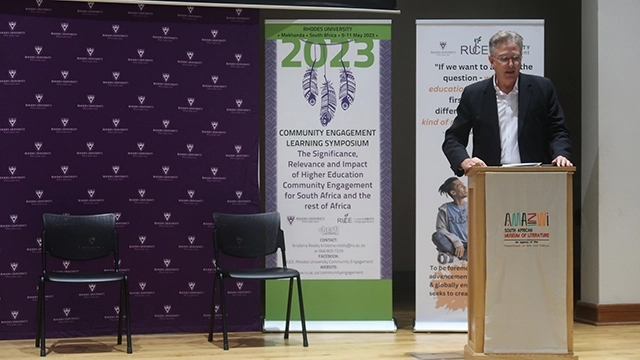
By Carmen Visser
On the second day of Rhodes University's Community Engagement Learning Symposium at the Amazwi South African Museum of Literature, the Deputy Vice Chancellor of Academic and Student Affairs, Professor ‘Mabokang Monnapula-Mapesela, encouraged attendees to engage in difficult and uncomfortable conversations. She argued that universities must make community engagement an integral part of academics and not simply "a contribution".
Keynote speaker Professor Peter Clayton, Rhodes University's recently retired Deputy Vice Chancellor of Research and Innovation, provided insight into knowledge co-creation and the challenges engaged researchers face. Furthermore, Professor Clayton argued that the core purpose of public universities is to disseminate, apply and create knowledge.
Rhodes University is turning 120 years old in 2024, having been founded in 1904. Contrastingly, Rhodes University Community Engagement (RUCE) is only 15 years old. For over 100 years, Rhodes University has been functioning without community engagement and as such, many of the operational and funding structures were developed without community engagement in mind. Considering such, "it is unsurprising that community engagement is still fighting for its rightful place within the institution," said Professor Clayton.
He further suggested that many universities consider community engagement as their "public good". However, he argues that community engagement that is mutually beneficial and considering it merely as "public good" is insufficient. Instead, Community Based Participatory Research, centring around the co-creation of knowledge, is needed. Professor Clayton added that Community Based Participatory Research produces the most significant levels of discomfort and, therefore, succeeds in creating and sharing knowledge. However, there are many challenges within the research and academia's community engagement principles, such as ethical criteria, timelines, originality, archiving and peer reviewing.
Researchers and academics must comply with ethical criteria and receive approval before carrying out research. Professor Clayton points out that while ethics need to be complied with, they can also make engaged research difficult because, in those cases, researchers have much less control over the circumstances. To combat this, he suggests that Community Based Participatory Research practitioners must serve on the ethics committees. Their first-hand knowledge and experience of engaged research will allow them to help establish processes that enable researchers to comply with ethical criteria without hindering or delaying their research.
Having been the Deputy Vice-Chancellor for Research and Innovation for 15 years (2007 - 2022), Professor Clayton has learnt the essential aspects of research. He argues that the most useful engaged research has been achieved through collaboration over extended periods, sometimes up to 15 years. However, timelines can be an obstacle for such research projects. For example, honours students only have a year to complete their research. Additionally, many academic staff and researchers are hired on short-term contracts. According to Professor Clayton, engaged research is often difficult due to these time restraints.
There are significant amounts of pressure for research to be original and archivable. Professor Clayton said that researched work must have the ability to be "stored away somehow and somewhere for future generations to benefit". Such a restriction on research places a lot of emphasis on the textual aspect of research. However, Professor Clayton added that creative outputs, such as films, scripts, paintings, and designs, are starting to be accepted within the scholarly space. After 15 years of discussions and debates, arts and other creative pieces of research outputs have become as accredited as textual-based research.
It is essential for the scholarly space to have these discussions and to figure out how other forms of research output can be accepted and measured. Professor Clayton argued that an essential aspect of this is peer review. And the same framework needs to be applied to Community Based Participatory Research. Professor Clayton described accredited engaged research as "the next challenge" and "a huge leap forward for the scholarly space". However, we must identify and change how we view knowledge. Moreover, the outputs that count as original and scholarly need to be updated to include concepts in the engaged research domain. Overall, the scholarly spaces need to continue discussing ways to improve in a manner that eases the research and publishing process.
Professor Clayton ended his presentation on co-creation and engaged research challenges by sharing news of Europe considering making the scholarly space open access without author fees. This change will make it much easier for researchers to publish their work and be recognised within such academic domains. Perhaps this is the next move for South Africa's scholarly space.

